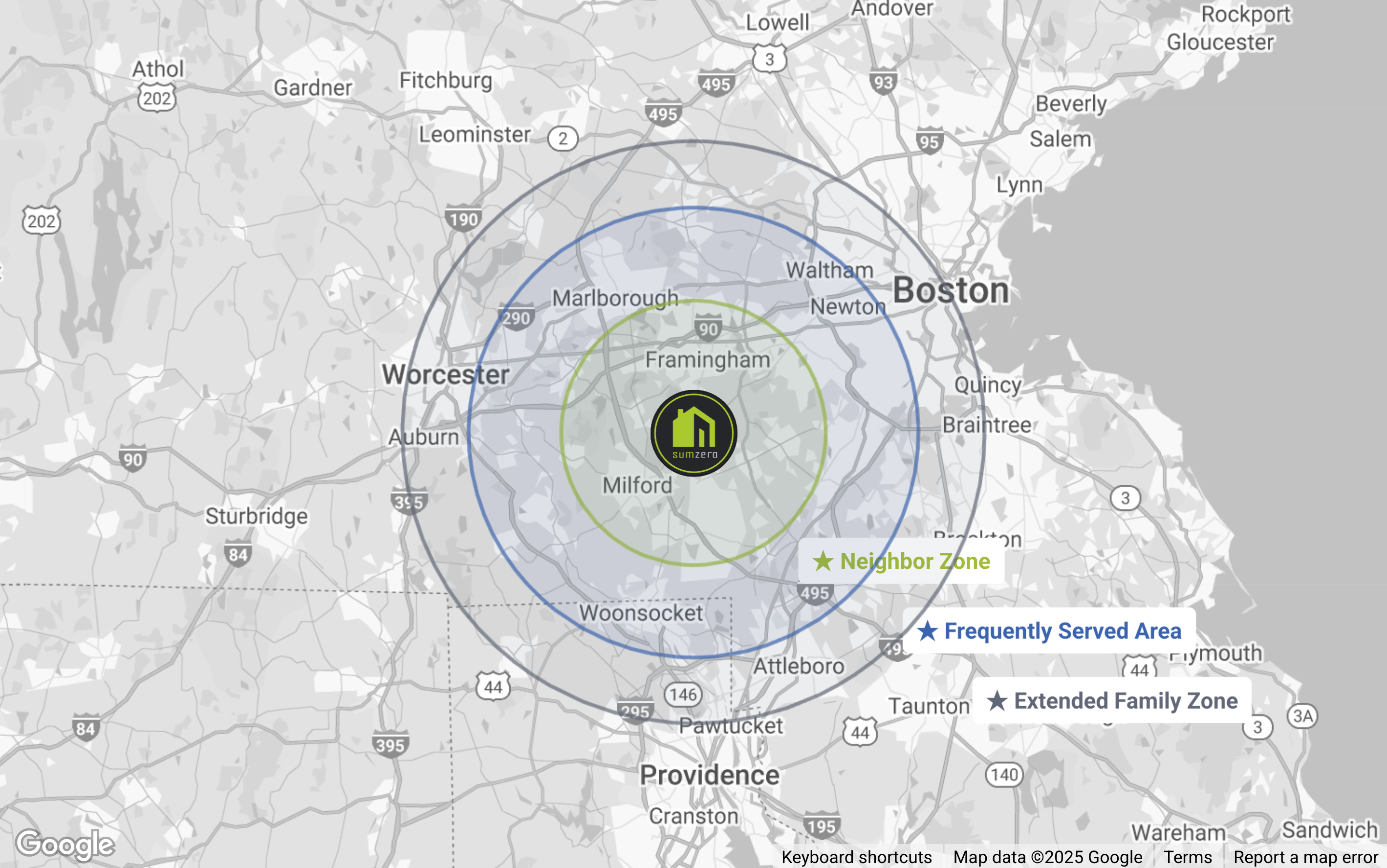Energy Recovery Ventilators | Auburn, MA
Energy recovery ventilators (ERV systems) are advanced home ventilation systems that exchange stale indoor air with fresh outdoor air while conserving energy. Designed for Auburn homes, our whole-house air exchangers improve indoor air quality and reduce heating and cooling costs, making your living environment healthier and more efficient.


Why Auburn, MA Homeowners Need ERV Systems Now More Than Ever
Located in the heart of Central Massachusetts, Auburn experiences a full range of seasonal fluctuations—from harsh, snowy winters to humid summers. These varying weather conditions often force homeowners to tightly seal their properties for temperature control. While this can help with home energy efficiency, it also compromises indoor air quality due to limited natural airflow. That’s where energy recovery ventilators (ERVs) come in.
ERV systems are increasingly becoming a smart solution for Auburn homeowners looking to enhance air quality control without sacrificing energy savings. With the town’s residential income levels above state average and growing attention on eco-friendly upgrades, many households in Auburn are turning to home ventilation systems as a practical investment. Local rebates from Mass Save and evolving energy codes are further incentivizing these upgrades, making this the ideal time to learn more.
“In Massachusetts, where homes are sealed tightly for energy savings, ERVs are no longer just a luxury—they're a necessity for balanced indoor air.” — Massachusetts Clean Energy Center
How Energy Recovery Ventilators Work in Auburn’s Seasonal Climate
A high-performing energy recovery ventilator works year-round to improve air circulation while minimizing energy waste. Understanding how these systems operate helps Auburn homeowners make informed decisions for their property and health.
What Does an Energy Recovery Ventilator Do?
An ERV takes stale indoor air and replaces it with fresh, filtered air from outside. It also transfers heat and moisture between the incoming and outgoing air streams. In winter, this means warming up incoming cold air without using extra energy. In Auburn’s steamy summers, excess humidity is expelled to keep your home feeling comfortable.
This balanced ventilation process:
- Reduces indoor pollutants and allergens
- Helps control excess humidity, especially in basements and attics
- Maintains overall air quality control without increasing HVAC load
Why ERVs Make Sense for Homes in Auburn, MA
Auburn is home to a variety of building styles—from updated colonials to newer townhouses—and many of these structures lack modern whole-house air exchanger systems. Winters can drop below freezing, and summers are humid and muggy. Traditional methods of ventilation, like keeping windows open, often conflict with energy-saving goals and aren’t viable year-round.
With ERVs, you get the ventilation needed for health—without skyrocketing your energy bills. Plus, newer Massachusetts building codes may require improved mechanical ventilation in new or renovated homes, positioning ERVs as a logical, future-proof upgrade.
Local Incentives for ERV Installation
Massachusetts homeowners are eligible for rebates and financing options through programs such as Mass Save, which encourage installations that prioritize home energy efficiency. Depending on your home’s heating system, insulation, and ERV type, these rebates can significantly reduce upfront costs.
“With ERVs qualifying under the Mass Save rebate program, Auburn residents have a clear path to improve air quality without breaking the bank.” — Mass Save Residential Rebates Coordinator
The Long-Term Benefits of ERV Systems in Auburn MA
Installing an ERV system isn’t just about immediate comfort—it’s about long-term home health, energy savings, and environmental responsibility. If you’re a homeowner in Auburn, the advantages of a properly engineered ventilation system directly affect your lifestyle and wallet.
Enhanced Indoor Air Quality Year-Round
Indoor air can often be 2 to 5 times more polluted than outdoor air, according to EPA standards. In tightly built homes, this pollution gets trapped, leading to frequent complaints of headaches, allergies, and moisture issues. ERVs counteract this by supplying a continuous flow of fresh air while filtering out pollutants.
Common indoor contaminants combated by ERVs include:
- Mold spores and airborne bacteria
- VOCs from household products
- Dust and pet dander
- Carbon monoxide traces
By controlling contaminants, you're ensuring good respiratory health for your family. It’s a level of air quality control that's especially important in seasons where windows stay shut for months at a time.
Big Gains in Home Energy Efficiency
ERVs capture and reuse thermal energy that would otherwise be lost during ventilation. During Auburn’s harsh winters, warming up outdoor air using recovered heat greatly reduces demand on your furnace. In the summer, outgoing air helps remove excess humidity from incoming air, easing the burden on your AC.
This thermal exchange provides:
- Reduced HVAC system cycling
- Lower monthly utility costs
- Longer lifespan of HVAC equipment due to reduced wear
When integrated into your existing HVAC systems by a certified installer, a properly sized ERV contributes significantly to home energy efficiency.
Designed to Fit Auburn’s Unique Home Styles
Whether you live in a compact raised ranch or a sprawling colonial, ERV systems come in a variety of configurations that can suit any home size or mechanical setup. In many Auburn homes where space or ductwork is limited, compact and ductless versions can be installed with minimal disruption.
“Older homes in Auburn often lack mechanical ventilation. Retrofitting with ERVs not only improves health and efficiency but boosts property value.” — Central MA HVAC Specialist
Choosing the Right Home Ventilation System for Auburn Properties
When considering an ERV system, understanding your options is crucial. Each home in Auburn may require different models based on square footage, insulation, and existing HVAC systems.
Understanding ERV vs HRV: Which Is Better?
Many homeowners face the ERV vs HRV decision. Here’s how to compare:
- HRVs (Heat Recovery Ventilators) exchange only heat. They're ideal for cold, dry climates.
- ERVs (Energy Recovery Ventilators) exchange both heat and moisture. Perfect for Auburn, where seasonal humidity is a concern.
Because Auburn experiences muggy summers and freezing winters, ERVs are often the superior choice, offering better air quality control and balanced ventilation all year.
Pairing ERVs With Existing HVAC Systems
A professional installer will evaluate your existing systems to determine integration points. In most Auburn homes:
- ERVs can be connected to your main ductwork
- Some models offer stand-alone operation (ideal for older homes)
- Custom configurations ensure consistent performance with minimal maintenance
When paired with high-efficiency HVAC units, ERVs round out a smart, sustainable comfort system that adapts to Massachusetts’ changing climate conditions.
Factors That Impact Installation and Operation
There’s no "one-size-fits-all" approach to whole-house air exchanger systems. Local Auburn regulations, your heating equipment, insulation levels, and physical space all influence your options. Working with a local provider ensures:
- Compliance with Massachusetts building codes
- Correct sizing for your square footage
- Proper filtration to address localized allergens like pollen and leaf mold
Your system should also consider Auburn’s rising number of energy-efficient homes, ensuring compatibility with strategies like net-zero construction and solar heating.
Why Home Ventilation Systems Are Becoming a Standard in Auburn Homes
The focus on energy conservation and wellness is shifting home ventilation systems from ‘luxury’ to ‘standard necessity’. As families in Auburn work to build healthier, more efficient homes, ERVs are playing a vital role in this transformation.
Preventing Moisture Problems and Structural Damage
Older homes in Auburn, particularly those with finished basements or attics, often suffer from moisture-related issues. Mold, rot, and condensation inside walls can not only damage your home but also affect your air quality. An ERV balances indoor humidity levels, helping prevent:
- Mold spore growth
- Wood rot in structural framing
- Yellowing or bubbling paint and drywall
By moving stale, moist air out and bringing dry, filtered air in, ERVs support better indoor climate control through balanced ventilation.
Supporting Massachusetts’ Move Toward Green Living
Massachusetts is a leader in climate-conscious building, regularly incentivizing energy-efficient upgrades. ERVs align perfectly with these goals by delivering energy conservation, humidity control, and reduced environmental impact simultaneously.
Installing an ERV is one of the few upgrades that checks every regulatory box:
- Enhanced home energy efficiency
- Improved health and safety
- Reduced HVAC load and carbon footprint
Combating Indoor Allergens and Health Triggers
Those living in Auburn know allergy season can be brutal due to dense tree cover and fluctuating humidity. During these months, ERVs filter incoming air and regulate moisture inside—both critical for reducing mold and allergen triggers.
Allergy-prone households and those with respiratory concerns benefit from:
- Constant exchange of filtered, fresh air
- Reduced dust mite populations via humidity control
- Fewer allergy flare-ups from pollen and spores
Install With Confidence: Local Expertise You Can Trust
When it comes to installing or upgrading an ERV in your Auburn home, it’s important to choose a provider who understands local code, climate demands, and architecture. Over-the-counter solutions from big box stores don’t offer the customized approach required for our region’s unique conditions.
A locally installed ERV system ensures:
- The right specs and performance for your household size
- Coordination with insulation upgrades, windows, or HVAC retrofits
- Optimized access to local rebates and energy savings initiatives
By working with trained professionals familiar with Auburn building codes and rebate programs, you avoid common pitfalls—like poor sizing or ventilation dead zones—that can limit system effectiveness.
“When you have Auburn’s climate, a high-performing ERV extends the life of your home and enhances everyday comfort. It’s a smart investment any way you look at it.” — Worcester County Energy Consultant
Summary: Cleaner, Safer Air for Auburn MA Homes
Energy recovery ventilators aren’t just about comfort—they’re about health, sustainability, and smart long-term investment. For Auburn homeowners, they deliver efficient, year-round airflow that adjusts to your needs through cold winters, humid summers, and everything in between.
With federal and state incentives backing installations, now is the perfect moment to consider upgrading your home ventilation system. Whether your goal is better air quality control, improved balanced ventilation, or all-around home energy efficiency, an ERV offers a future-ready solution that fits Auburn life.
For more information about best practices and ventilation system types, visit the EPA’s Residential Air Cleaners Guide.
What Local Homeowners Are Saying
See how SumZero has helped local homeowners stay comfortable year-round with energy-efficient heat pump solutions.
Not Sure Where to Start? We’ll Guide You
Let our experts design the right heating and cooling solution—customized for your comfort, your layout, and your energy goals. No pressure. Just clarity.
Request FREE ESTIMATE









